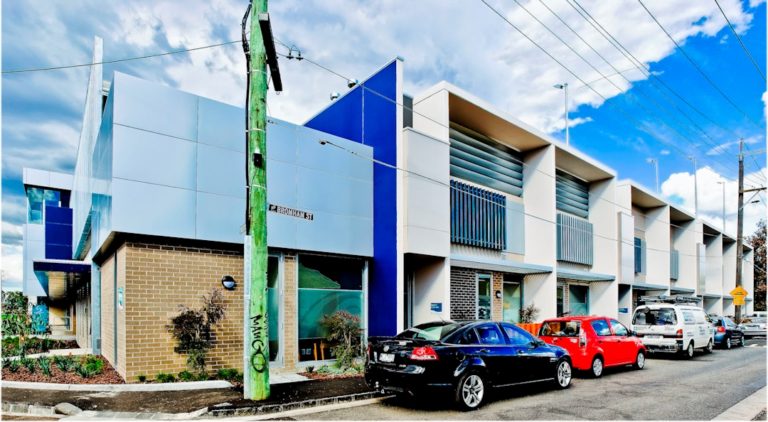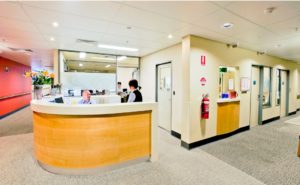Practices in Focus
The Melbourne Clinic

The Melbourne Clinic (TMC) is a purpose-built psychiatric hospital located in Melbourne’s CBD, focused on providing a comprehensive range of general and specialty inpatient, day program and outreach services. The facility offers these services to people from the metropolitan Melbourne area, but also those from rural Victoria, inter-state and overseas.
TMC had an aim to ensure all felt safe, welcome, comfortable and supported, where they are able to disclose their gender identity and sexual preferences without fear of discrimination or harassment.
Services for inpatients can range anywhere from support for mental health, to substance withdrawal and rehabilitation, eating disorders, mood disorders, obsessive compulsive disorders and intensive care services.
TMC accessed research indicating members of the lesbian, gay, bi-sexual, transgender, intersex, queer, asexual people and their allies (LGBTIQA+) community are more susceptible to decreased mental well being due to the increased occurrence of discrimination, marginalisation, exclusion, violence, and stress experienced by members of the in the LGBTIQA+ community. These factors also contribute to the difficulty or reluctance of seeking or maintaining support services.
Research in Australia and globally demonstrates that LGBTIQA+ people have poorer health outcomes than the general population because of the discrimination that they experience. In terms of mental health in particular, LGBTIQA+ people experience markedly higher levels of depression, anxiety, emotional distress and for some, self-harming and attempts of suicide. The actual or perceived discrimination by services also means LGBTIQA+ people are more likely to avoid or delay seeking care.

TMC strive to ensure their services provide a safe environment for those people seeking and in need of support and that their therapeutic interventions are tailored to each patients lived experience and recovery goals.
In early 2016, TMC’s team began to explore ways to ensure that the LGBTIQA+ and extended community felt confident and comfortable accessing their services. TMC acknowledged that their patients, visitors and staff came from diverse backgrounds and many identified with the LGBTIQA+ community. TMC had an aim to ensure all felt safe, welcome, comfortable and supported, where they are able to disclose their gender identity and sexual preferences without fear of discrimination or harassment.
The solution TMC’s team found was the become accredited under the Rainbow Tick Accreditation Program, a voluntary program which aims to address the health inequities for LGBTIQA+ people, by assisting the organisation to understand and respond to the needs of their LGBTIQA+ health consumers, staff and stakeholders. The Rainbow Tick Accreditation program is assessed and awarded by Quality Innovation Performance Limited (QIP), with the Rainbow Tick Standards owned and developed by Rainbow Health Victoria.
Interview
The AGPAL Team caught up with Sue Jones, TMC’s Quality and Risk Manager, to find out all about their recent Rainbow Tick Accreditation and the process undertaken by their team to achieve their accredited status.
AGPAL Team: What was your team’s approach to undertaking Rainbow Tick accreditation for the first time?
Sue: With the strong leadership of our General Manager, Gaylyn Cairns, we developed a gap analysis against the Rainbow Tick Standards. The first initiatives identified were to commence a Diversity, Equity and Inclusivity Committee of interested members, recruit a LGBTIQA+ Champion and Consumer Consultant to guide the changes and developments needed to demonstrate our compliance with the Standards. We reviewed our current quality and risk management processes, including policies and consumer information to ensure they reflected our diverse and inclusive service. To prepare consumers, staff and stakeholders we had been advertising and discussing the pending Rainbow Tick Accreditation in Newsletters and Committee/Team Meetings at every available chance.
AGPAL Team:As part of the accreditation process, your team is required to undergo inclusivity training – how did you find the training? Was there any stand out learnings you took from this training?
Sue: We accessed training through GLHV which was comprehensive and motivating. We had an overwhelming response from staff wanting to attend. The most powerful thing to come out of the training was the feedback from staff. They were incredibly motivated and engaged to work together to improve our current services and had a willingness to reflect on current attitudes and opinions.
We also included information regarding specific components of the Rainbow Tick Standards, diversity and inclusivity information in our orientation Training Sessions. We engaged a clinician/trainer with a wealth of experience working with members of the LGBTIQA+ community, who provided clinically based trying to staff and developed a training package on diversity and inclusivity we can facilitate ourselves as part of mandatory training.
AGPAL Team: How did you find the overall accreditation process?
Sue: I found that there was good support and direction around the expectations from QIP. The actual assessment was a positive experience, with the Assessors being flexible in their approach, and very interested in our service and any accomplishments. I was very impressed with the accreditation report which was thorough and offered constructive and appropriate recommendations for further improvements.

AGPAL Team: If an organisation was thinking about undergoing Rainbow Tick accreditation with QIP, what tips would you like to share with them?
Sue: I would highly recommend the process. I would suggest that the input of a LGBTIQA+ Champion and Consumer Consultant is invaluable, so make this a priority. Ensure your leadership team are on board and keep your staff and consumers up to date with any changes and developments. Training and communication are essential parts of the process. Be open to suggestions from staff, consumers and stakeholders.
AGPAL Team: You were successful with a number of developments, achievements and activities as part of your accreditation journey, what did you and your team find to be the most rewarding part of the journey toward your Rainbow Tick?
Sue: The overwhelming feedback is that we have improved our patient/client service by undertaking the Rainbow Tick accreditation process and that our staff found it an engaging, interesting and motivating process both professionally and personally. Our Rainbow Tick accreditation achievement validated TMC’s aim to provide quality mental health care, supported by evidence based practice.
We would like to thank Sue and her team at TMC for sharing their accreditation journey with us and their achievement of improving service delivery to their community members.




